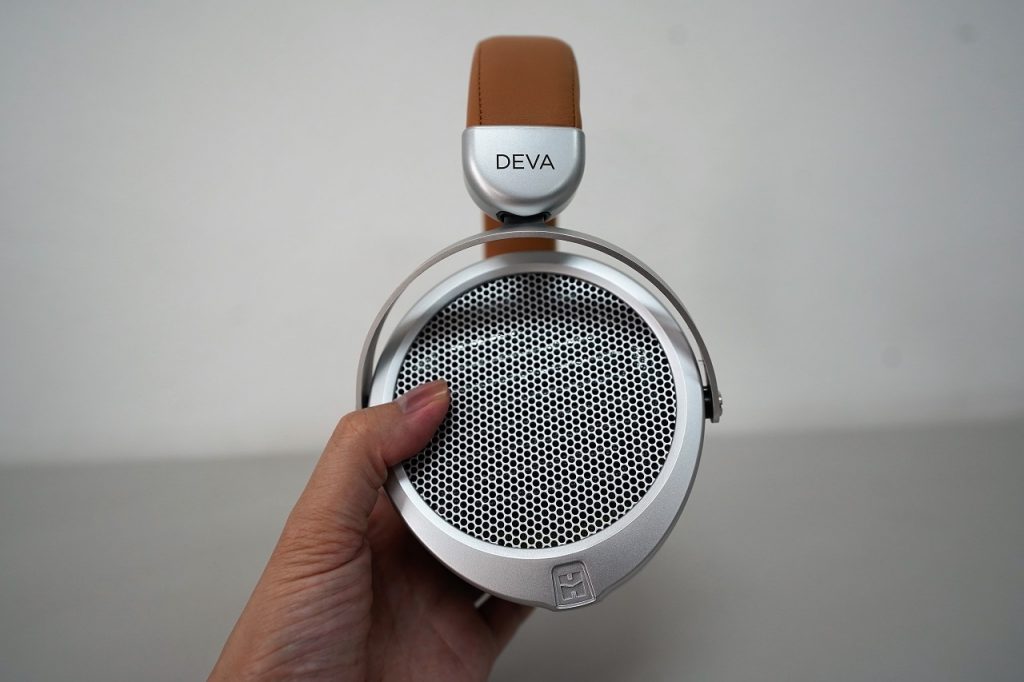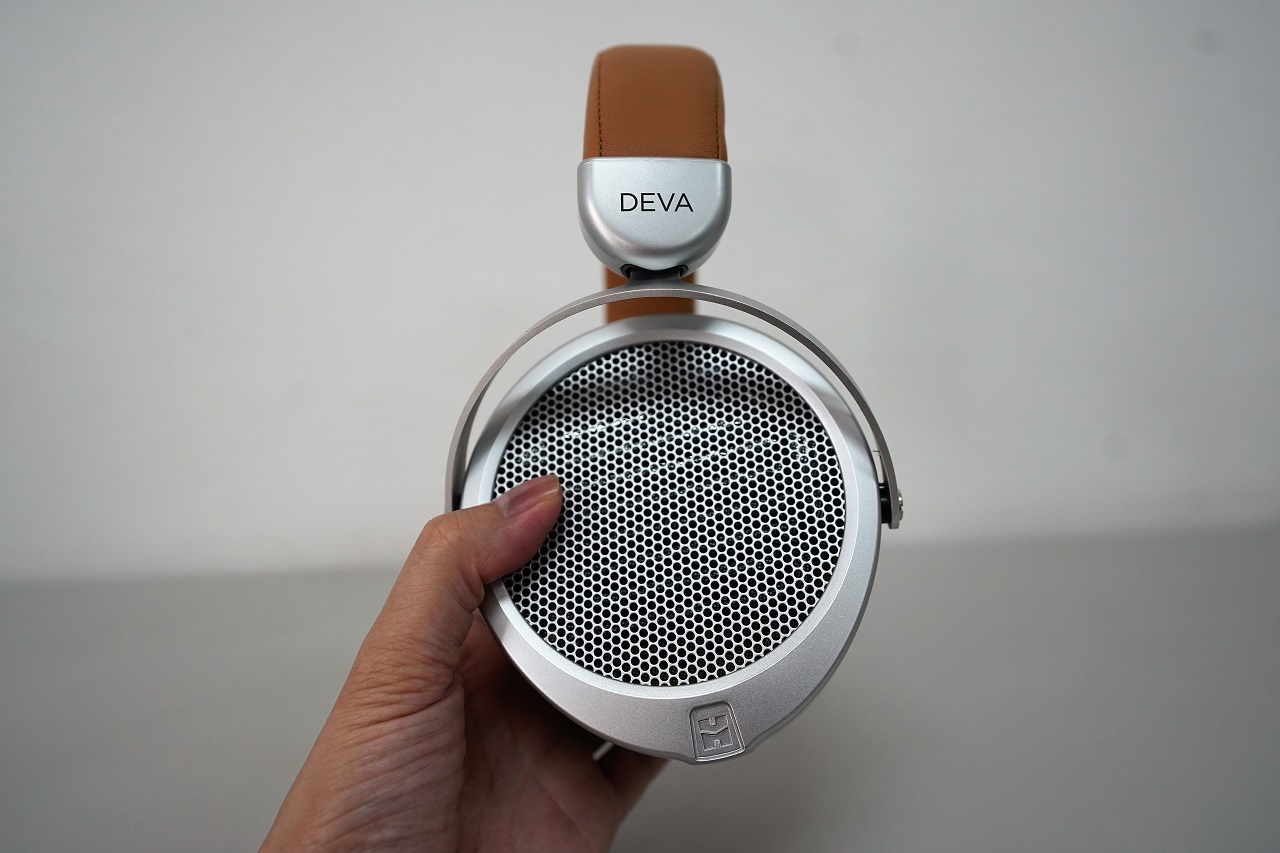Sound Quality
At the beginning of this review, I did say I enjoyed my time with it and you probably easily guessed that it’s because of the sound. You’re right.
The Deva goes for a neutral spacious tonality that has some slight warmth, and treble sparkle without being fatiguing or harsh.
Starting off with the bass, it actually rolls up a little early so it doesn’t have the visceral feel that you get from the sub-bass area. Whatever that lack of extension is, the Deva makes up with accentuated mid-bass and essentially it’s a gentle sloping line as it moves towards the lower mid-range where it just has enough body. The transition here is mostly what determines whether a headphone is warm, or lean and lacking body. The Deva is ever so slightly on the warm side of neutral for me.
I feel the bass is not the tightest here. It’s not too bloomy or bloated but it’s a tiny bit soft on the presentation. It still has decent punch and it’s just better overall than the HE400i which I find to be too flat or neutral despite having better extension.
The midrange is fairly flat before sloping down around the upper mids where it’s again, slightly muted. This is to me genre-specific but the recession here causes some harmonics to be subdued which results in somewhat soft instrument tones. I can spot it on progressive rock tracks and when listening critically, but 95% of the time, I don’t have a problem with it.
The treble frequency goes up and is a little wiggly and uneven but I did not find it to be disconnected or odd sounding. The overall treble resolution is also quite good. A little splashy, maybe even hot but not harsh or sibilant because the level is not overly cranked up. To my ears, it sounds better than the HE400i, HE400s, and DT880. All those three exhibits some shrillness and metallic texture to varying ranges.
The soundstage is very good with the Deva. Pretty spacious, good width and even though the center image is a little pulled towards you, the overall presentation is still quite pleasant. I feel out of the different characteristics of the headphone’s sonic performance, the soundstage is one that a budding audiophile can get amazed to the easiest so if this is super noticeable if you are coming from a closed-back headphone.
I have no issues with the way it images. Instrument layering is ok and transient response is quick as is the case with planar headphones. It lacks some air frequencies (i.e. over 10Khz) and I feel for an extremely open-sounding headphone, that gets noticed even more.

Wireless vs Wired vs USB
Like the case with most decent headphones that can be used wirelessly, I find the Deva’s signature to not change much between the three modes. It is however easily noticeable that the USB wired mode is the best sounding.
To my ears, the bass punch is harder and the overall sound opens up a bit more when using the headphone through USB which isn’t that surprising considering it is using a dedicated amplifier and DAC from the adapter. Wireless mode isn’t too far and I’m not too confident passing a blind test comparing both.
The Deva is quite inefficient so you may need to hook it up with an amp if you’re using it with a 3.5 mm cable. I have to max out my phone’s volume in order to get a decent listening experience, and the bass gets quite a bit bloomy as well.
Battery
A quick note on the battery, it’s horrible. Horrible, in the context of it being a wireless headphone. I can max out the battery in a day’s use and in my tests, I find that it only lasts between 6 to 8 hours. Using the adapter via USB playback mode and that number shrinks further to just 4 hours.
Comparison against the THX Panda
I raved about the THX Panda in my review simply because it’s so far ahead compared to the consumer wireless offerings available today. I still think it’s a competitive option but it’s not an apple to apple comparison against the Deva.
For starters, the Deva is an open headphone, has larger drivers and is physically bigger. The THX Panda, on the other hand, is really for portable applications and barely an over-ear headphone.
So comparing their sound performance, the THX only beats the Deva in bass extension and impact. Maybe the lower mids having more body as well if you like that, but outside of those, the Deva is a much more refined sounding headphone whereas the THX Panda has some muffled character in the upper ranges.
But then if you have the THX Panda in your list, maybe you need a sealed headphone? Cause the Deva again isn’t.
Conclusion
The Deva is an easy recommendation if you’re looking for an entry or mid-level open headphone and value the convenience of being able to use it wirelessly. Remember the Deva is not a true wireless headphone so you don’t really have to worry about that complicated circuitry or the DSP processing. The drawback of that oversimplification is the barebone functionality that it has. Simple things like volume control and skipping tracks are not possible at all.
I feel the Deva is also competitive in the wired category although its value plummets a little. It’s definitely better than the old HE400i and 400s but falls short against the Sundara, the HD6xx, and HE5xx from Drop. The 2020 version of HE400i may be a compelling option as it’s significantly cheaper at $170. That is if all you’re looking for is the best possible open sound at the cheapest possible price.
For pure wireless use, it’s the best that I’ve heard so far. It handily beats the THX Panda, and certainly trounces any consumer-oriented BTNC headphones. I have personally not heard the Audeze Mobius yet but that might be a good competition for this given their similar-ish price range.
I could be wrong but I feel the appeal of the Deva is most strong for folks who want to finally buy their first open headphone but also want that added convenience of using it wirelessly (somewhat). Now is there really a market for that? I don’t know.
All I know is I’ve enjoyed my time with it because I can walk around my house and still have that open audiophile sound that I’m super used to while sitting at my desk. That I find quite valuable.
You can check out the Deva from Hifiman’s website. If you live in the Philippines, you can audition and buy this headphone from Egghead Audiohub.


